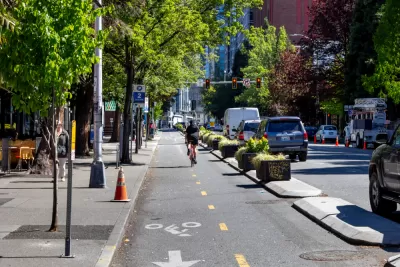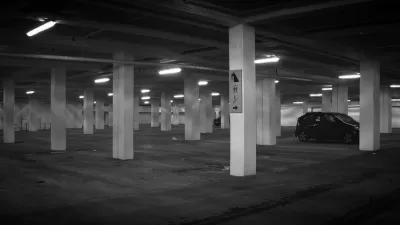In a set of recommendations submitted to the city, the commission calls for revised land use and transportation policies that reclaim public space from cars and shift focus away from vehicle throughput to more pedestrian-oriented uses.

A document submitted to the city of Seattle by its Planning Commission outlines an ambitious set of recommendations aimed at reclaiming public right-of-way for people, mitigating the impact of climate change, and improving safety on the city’s streets. The brief notes that road deaths and injuries are on the rise in spite of the city’s Vision Zero pledge.
“The brief goes on to note that the city will not be able to accommodate the growth anticipated in the coming decades if streets continue to be used in the same way they are now, stating that the status quo will ‘literally kill us,’” Ryan Packer writes in The Urbanist. The Commission calls on the city to include their recommendations in the update of the Seattle Comprehensive Plan, which will undergo a major update in 2024.
“Among the Planning Commission’s recommendations is the removal of vehicle storage from the current Comprehensive Plans’s list of needs that should be accommodated on city streets,” calling instead for “a citywide parking policy and plan that looks to balance revenue needs with opportunities for multi-function streets that provide more options, public space, and environmental benefits.”
The commission also highlighted the discrepancy between the proposed comprehensive plan update and the Seattle Department of Transportation’s Transportation Plan, which, according to a letter sent to SDOT earlier this year, “appear[s] to assume a future high rate of trip-making by privately owned vehicles, with the only variable being whether those vehicles are electric.” The focus on electrification, the commission pointed out, “will miss an opportunity to evaluate alternatives that the City has far more influence over, and that align with the forthcoming update to the Comprehensive Plan.”
As Packer notes, it remains to be seen whether the mayor and city council will adopt the Planning Commission’s bold, transformative vision for more sustainable and equitable land use and transportation planning.
FULL STORY: Planning Commission Pushes for Bolder One Seattle Plan Re-envisioning City Streets

Maui's Vacation Rental Debate Turns Ugly
Verbal attacks, misinformation campaigns and fistfights plague a high-stakes debate to convert thousands of vacation rentals into long-term housing.

Planetizen Federal Action Tracker
A weekly monitor of how Trump’s orders and actions are impacting planners and planning in America.

San Francisco Suspends Traffic Calming Amidst Record Deaths
Citing “a challenging fiscal landscape,” the city will cease the program on the heels of 42 traffic deaths, including 24 pedestrians.

Defunct Pittsburgh Power Plant to Become Residential Tower
A decommissioned steam heat plant will be redeveloped into almost 100 affordable housing units.

Trump Prompts Restructuring of Transportation Research Board in “Unprecedented Overreach”
The TRB has eliminated more than half of its committees including those focused on climate, equity, and cities.

Amtrak Rolls Out New Orleans to Alabama “Mardi Gras” Train
The new service will operate morning and evening departures between Mobile and New Orleans.
Urban Design for Planners 1: Software Tools
This six-course series explores essential urban design concepts using open source software and equips planners with the tools they need to participate fully in the urban design process.
Planning for Universal Design
Learn the tools for implementing Universal Design in planning regulations.
Heyer Gruel & Associates PA
JM Goldson LLC
Custer County Colorado
City of Camden Redevelopment Agency
City of Astoria
Transportation Research & Education Center (TREC) at Portland State University
Jefferson Parish Government
Camden Redevelopment Agency
City of Claremont





























